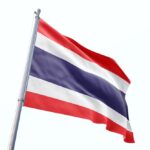Thai MPs linked to online gambling bribes fail to attend House of Representatives meeting

Two Thai Members of Parliament accused of bribing police officers with online gambling proceeds failed to show up to a meeting of the country’s House of Representatives Security Committee this week.
According to Nation Thailand, the MPs from Songkhla, Chanonpat Naksua and Somyos Plai-duang, were absent from the meeting, where information was provided by former Deputy Police Chief Gen. Surachate Hakparn and Chairman of the Crime Victims Assistance Club Achiraya Ruangrattanapong.
Witness Pimwilai Pongon also gave evidence regarding online gambling-linked bribes.
Pongon said, “I did transfer the money as instructed. The person who hired me coordinated with someone who would come to collect it on the fifth and tenth of every month. He informed me that the police unit receiving the money was the PCT 4 unit, and the money would be transferred to Deputy Gamo. I filed a complaint at the Hat Yai Police Station.”
Others, including local politician Vichai Chookamnerd, who received THB100,000 (US$3,093)1 THB = 0.0309 USD
2025-11-14Powered by CMG CurrenShift in a transfer, and a proxy account named Kachacharn, linked to police officer Darb Yao, were also discussed.
Further money trails revealed 38 overall transactions, totaling THB3 million (US$92,792)1 THB = 0.0309 USD
2025-11-14Powered by CMG CurrenShift.
Hakparn has instructed the Security Committee to refer the matter to the National Anti-Corruption Commission and the Anti-Money Laundering Office, and to seize assets from police officers who received bribes.
Earlier this week, Thailand approved the extradition of illegal gambling operator She Zhijiang to China, who is accused of running illegal gambling networks.
Abi Bray brings strong researching skills to the forefront of all of her writing, whether it’s the newest slots, industry trends or the ever changing legislation across the U.S, Asia and Australia, she maintains a keen eye for detail and a passion for reporting.
Verticals:
Sectors:
Topics:
Dig Deeper
The Backstory
Why the bribery furor matters now
Thailand’s escalating confrontation with illicit online gambling has moved from back-room money trails to the halls of power, sharpening questions about police integrity and political accountability. The current flare-up centers on allegations that proceeds from online gambling were funneled as bribes to law enforcement, with investigators outlining recurring transfers, proxy accounts and a pattern of payouts timed to the fifth and tenth of each month. The controversy has broadened beyond individual accusations to touch systemic oversight, with calls to involve the National Anti-Corruption Commission and the Anti-Money Laundering Office and to seize assets tied to suspected graft.
The stakes are wider than a single case. Thai authorities have elevated online gambling to a national security concern, linking it to cybercrime, money laundering and public corruption. The result is a rolling clampdown across provinces and platforms, paired with headline-grabbing investigations that are testing legal boundaries and institutional will. As Parliament weighs how deep the problem runs, investigators are mapping networks that look less like casual betting sites and more like organized businesses designed to move money fast and quietly.
Crackdowns reveal businesslike gambling networks
Police actions over the past year describe an industry operating with corporate precision. In one major case, the Cyber Crime Investigation Bureau dismantled an unlicensed igaming network allegedly run by a former Muay Thai champion that handled more than THB100 million in wagers over three years. Authorities said the site, g2g69bet, assigned clear roles across administration, fund management and customer handling, and maintained a steady flow of deposits and withdrawals despite attempts to mask activity. Raids at nine locations led to eight arrests and the seizure of computers, phones and ATM cards, with suspects facing unauthorized gambling and money laundering charges.
The same bureau has traced smaller but sophisticated operations that blend automation with low-profile local staffing. In Chiang Rai, cyber police shut down an online casino fronted by a 24-year-old administrator, seizing a laptop and phone tied to a platform that reportedly relied on domestic bank accounts for automated deposits and processed withdrawals directly on the site. Investigators estimated 9,000 users and monthly turnover of THB5 million, showing how mid-tier networks can scale without drawing early scrutiny. Police have linked these cases to a broader campaign against illegal gambling outfits they say overlap with fraud and laundering rings.
Taken together, the cases sketch a picture of an industry that is resilient and decentralized. Sites outsource key functions, rotate personnel and exploit gaps between banking controls and online payment tools. That structure complicates enforcement and raises the risk that proceeds can be used to fortify the networks themselves or, as alleged in the current controversy, influence those tasked with shutting them down.
When pageantry meets prohibition
The fight over online gambling has spilled into Thailand’s cultural showcase as well. Police recently turned their attention to global entertainment branding when they raided the Miss Universe Thailand host team over alleged online casino promotion. Investigators examined an image of Miss Philippines posing with a pillow bearing what appeared to be a logo linked to a foreign gambling operator. Organizers denied ties to the company, and the host committee publicly distanced itself from the sponsorship. While no formal charges have been announced, the episode underscores the legal risks of even indirect promotion in a country where online casino activity remains illegal.
The incident highlights a gray zone for brands and influencers, especially as international sponsors push into markets with uneven gambling rules. For regulators, the question is whether high-visibility endorsements help normalize illegal products and, by extension, facilitate the flow of money to the very networks police are trying to shut down. For pageant organizers, it underscores the need for diligent vetting of sponsors whose products may be lawful in one jurisdiction and illegal in another.
Regional pressure builds on platforms and intermediaries
Thailand is not alone in trying to stem the spread of online gambling by attacking distribution channels. In the Philippines, lawmakers have turned their focus to social media amplification and payment linkages, escalating scrutiny of tech firms seen as conduits for unlicensed ads and transactions. A Senate panel said it would issue a show cause order after Meta failed to attend a hearing on the rise of online gambling, with the committee chair warning of a subpoena if executives do not engage. The move followed public criticism of the national regulator for a surge of gambling promotions on platforms including Facebook, Google, YouTube and X.
That pressure is instructive for Thailand. Even aggressive police work has limits if ads continue to reach consumers and e-wallets or domestic accounts can facilitate fast deposits and withdrawals. Policymakers across Southeast Asia are converging on the same pain points: social platforms that host or algorithmically promote gambling content, and payment rails that provide the last mile for unlicensed operators. Coordinated inquiries and data-sharing across agencies could force greater compliance from intermediaries, narrowing the space for illegal sites to grow.
Causality, accountability and what comes next
The current scandal’s core question is not just whether bribes changed hands, but how illicit gambling profits move through the system and where safeguards failed. The recurring monthly transfers outlined by witnesses mirror the cadence of steady gaming revenue, suggesting a pipeline that turned small payments into sustained influence. If the anti-graft and anti-money laundering agencies trace those flows back to operational hubs already identified by cyber police, Thailand could tie frontline arrests to higher-level accountability and asset seizures.
Recent law enforcement actions show momentum. Operations in Chonburi, Lamphun and Chiang Rai have disrupted logistics, seized digital assets and put administrators on notice. At the same time, international cooperation is tightening. Authorities have moved to extradite high-profile figures accused of running illegal gambling networks abroad, signaling that cross-border evasion is no longer a reliable shield. Linking domestic probes to regional arrests could reduce safe havens for operators who shift infrastructure beyond Thailand’s borders.
For Parliament, the credibility test is whether oversight bodies can independently verify money trails and impose consequences without political interference. For police leadership, it is whether internal controls can prevent units from becoming targets of influence campaigns funded by steady, illicit cash flow. And for the public, the outcome will shape confidence in institutions that must navigate the line between increasingly digital vice markets and the rule of law.
The trajectory from site-level takedowns to allegations of systemic bribery shows how quickly online gambling can morph from a policing problem into a governance challenge. The next phase will likely hinge on forensic follow-through: freezing assets, mapping networks and aligning platform and payment policies with enforcement goals. If investigators can translate arrests and raids into durable deterrence — and if lawmakers back that with clear accountability — Thailand could narrow the profit motive that fuels the cycle. If not, the same networks that built businesslike operations online may continue to probe for weaknesses offline, including in the institutions meant to stop them.








